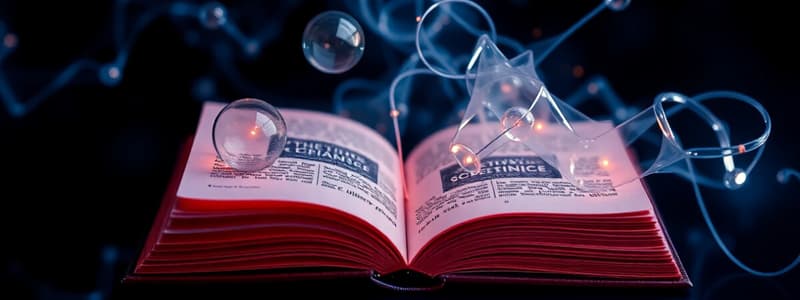Podcast
Questions and Answers
How did the ancient Egyptians approach the treatment of open wounds, and what modern scientific understanding supports this practice?
How did the ancient Egyptians approach the treatment of open wounds, and what modern scientific understanding supports this practice?
- They performed complex surgical procedures, a practice supported by modern understanding of anatomy.
- They cauterized wounds with fire, a practice supported by modern understanding of sterilization. (correct)
- They covered wounds with moldy bread, a practice supported by modern understanding of penicillin.
- They used herbal remedies, a practice supported by modern understanding of phytochemistry.
Considering the views of the earliest Greek scientists/philosophers, what distinguished their approach to understanding the natural world from that of earlier cultures like the Egyptians or Mesopotamians?
Considering the views of the earliest Greek scientists/philosophers, what distinguished their approach to understanding the natural world from that of earlier cultures like the Egyptians or Mesopotamians?
- They rejected mythological explanations in favor of purely empirical data.
- They constructed elaborate devices to measure natural events, improving accuracy. (correct)
- They used collected facts and observations to formulate explanations, rather than just recording observations.
- They established formal institutions dedicated to scientific research and education.
What belief did Anaximander propose regarding the origin of human life, and how does this relate to modern scientific thought?
What belief did Anaximander propose regarding the origin of human life, and how does this relate to modern scientific thought?
- Humans spontaneously arose from non-living matter, supporting abiogenesis.
- Humans descended from primates, aligning with primate evolution. (correct)
- Humans originated from divine beings, a view consistent with creationism.
- Humans developed from aquatic creatures, an idea that foreshadows the theory of evolution.
What was Anaximenes' primary belief about the fundamental substance of nature, and what concept did this eventually lead to?
What was Anaximenes' primary belief about the fundamental substance of nature, and what concept did this eventually lead to?
How did Aristotle contribute to the structure of scientific study?
How did Aristotle contribute to the structure of scientific study?
What is Archimedes best known for regarding science and mathematics?
What is Archimedes best known for regarding science and mathematics?
Why did the Roman Catholic Church support the geocentric system, and what was the outcome of this support?
Why did the Roman Catholic Church support the geocentric system, and what was the outcome of this support?
During the Dark Ages, what role did Roman Catholic monks play in the preservation of scientific knowledge?
During the Dark Ages, what role did Roman Catholic monks play in the preservation of scientific knowledge?
How did limitations in trade and communication during the decline of the Roman Empire affect scientific progress, and what broader lesson does this illustrate?
How did limitations in trade and communication during the decline of the Roman Empire affect scientific progress, and what broader lesson does this illustrate?
What was the primary goal of alchemists during the Dark Ages, and how did their approach differ from modern scientific methodology?
What was the primary goal of alchemists during the Dark Ages, and how did their approach differ from modern scientific methodology?
Flashcards
What is Science?
What is Science?
From the Latin 'scientia,' it's a structured quest to gather and classify observable facts, formulating laws about the natural world.
Science Definition
Science Definition
Systematized and methodical exploration of nature to understand phenomena through objective laws.
What is Philosophy?
What is Philosophy?
From Greek 'philosophia', meaning love of wisdom, it addresses ethics, metaphysics, epistemology, and logic.
Who may be called the first scientists?
Who may be called the first scientists?
Signup and view all the flashcards
Who was Thales of Miletus?
Who was Thales of Miletus?
Signup and view all the flashcards
Who was Anaximander?
Who was Anaximander?
Signup and view all the flashcards
Who was Anaximenes?
Who was Anaximenes?
Signup and view all the flashcards
Who was Leucippus?
Who was Leucippus?
Signup and view all the flashcards
Who was Aristotle?
Who was Aristotle?
Signup and view all the flashcards
Who was Archimedes?
Who was Archimedes?
Signup and view all the flashcards
Study Notes
- The word "science" originates from the Latin term "scientia," which means "to have knowledge."
- Science is dedicated to the accumulation and classification of observable facts to formulate general laws about the natural world.
- Science can be described as the methodical knowledge about nature, developed through speculation, observation, and experiment, leading to objective laws.
- Science is a process of trial and error, so the objectives are not necessarily correct as stated by Thomas Crump in 2001.
- Science is a disciplined attempt to discover what exists in nature and how things work.
Philosophy Defined
- Philosophy comes from the Greek word "philosophia", meaning "love of wisdom."
- Philosophy seeks to address big questions about ethics, metaphysics, epistemology, and logic.
- Philosophy is the rational investigation into the truths and principles of being, knowledge, and conduct.
- Simply put, philosophy is a way of thinking.
Importance of Studying History and Philosophy of Science
- Understanding the history and philosophy of science enables an understanding of the present state of science.
- History and philosophy provide essential lessons about how science should be conducted.
- This study can help in understanding the future directions of science.
Earliest Signs of Scientific Thought
- Records indicate that ancient Egyptians had sophisticated medical practices by 3000 B.C.
- Egyptians discovered that moldy bread applied to wounds promoted quicker and cleaner healing
- Modern science links this effect to penicillin, produced by bread molds, which kills wound-affecting germs.
Development of Scientific Thought (600 B.C. to 500 A.D.)
- The first true scientists/philosophers were the ancient Greeks, who collected facts, made observations, and explained the natural world.
- Other ancient cultures collected observations and facts without developing explanations for the world around them.
- Thales, Anaximander, and Anaximenes, in the 6th century B.C., are first to use observation and fact-based natural world explanations.
- Many historians regard these three Greeks as humanity's first real scientists.
Thales of Miletus (624 B.C. - 546 B.C.)
- Thales studied celestial bodies to understand the patterns and movements of planets and stars.
- He predicted planetary events, e.g. he correctly and famously predicted a solar eclipse.
Anaximander (610 B.C. - 546 B.C.)
- Anaximander, possibly a student of Thales, focused on the origin of life.
- He was the first scientist to attempt explaining human origins without reference to a creator.
- He theorized that all life originated in the sea and humans evolved from fish, an early concept of evolution later supported by Charles Darwin.
Anaximenes (585 B.C. - 526 B.C.)
- Anaximenes, possibly an associate of Anaximander, believed air was the basic substance of nature.
- He thought thinned air becomes fire, while thickened air condenses into liquids and solids.
- His concept to explain nature using a single substance led to the Greek concept of atoms.
Leucippus and Democritus
- Leucippus lived 100-150 years after Anaximenes.
- Leucippus built upon Anaximenes' concepts, proposing matter is composed of atoms and is known as the father of atomic theory.
- Democritus, Leucippus' student, believed all matter resembled sand, made of atoms.
- Democritus stated atoms are in constant motion.
Notable Greek Scientists
- Ancient Greece produced three notable scientists.
- Aristotle (384 B.C. - 322 B.C) is considered the father of life sciences Aristotle wrote on philosophy, mathematics, logic, physics, metaphysics, biology, botany, medicine, dance, and theater.
- He was a student of Plato, who was a student of Socrates.
- Aristotle classified knowledge into physics, metaphysics, and psychology, laying the base for modern sciences.
- Archimedes lived roughly 100 years after Aristotle and advanced science through mathematics.
- Archimedes applied mathematical formulas to explain phenomena, linking math and science.
- Archimedes' work with fluids allowed predictions about floating objects in liquids
Claudius Ptolemy (100 A.D. - 170 A.D.)
- Ptolemy studied the heavens in an attempt to describe planets and stars.
- He theorized Earth was the universe's center, planets, and stars orbit Earth in circles.
- Ptolemy's model explained astronomical data, gaining popularity and is called the Ptolemaic or geocentric system.
- The Roman Catholic Church supported the geocentric system, resisting scientific evidence against it.
- The church believed in the Earth in the center since God created mankind.
- It took scientific data and expulsions to change this belief.
- The church became viewed as antagonistic towards science.
Science in the Dark Ages (500 A.D. - 1000 A.D.)
- Science had progressed steadily from Thales, Anaximander, and Anaximenes until 400 or 500 A.D.
- The ideas were debated and refined.
- Aristotle and Ptolemy's works became guiding scientific inquiry principles.
- Science stalled because of the Roman Empire's dislike.
- Rome discouraged real science, while accepting inventions to improve work.
- Alchemy represents the period's "science," as alchemists sought to transform lead into gold.
- Alchemists recorded interesting observations and useful substance recipes.
- Like ancient Egyptian medicine, alchemists used trial and error. They didn't draw conclusions about nature.
Influence on Scientific Progress
- Breakdown of the Roman Empire impacted scientific communication.
- Stalled scientific progress.
- The Dark Ages saw Rome crumble.
- Communication became harder.
- Scientific progress depends on scientists, government, and culture.
- Roman Catholic monks preserved accumulated scientific knowledge during this period.
- Monks believed God revealed Himself through Scripture and nature.
- They preserved Scripture and scientific knowledge, creating encyclopedias.
- Vast encyclopedias helped subsequent science flourish.
Studying That Suits You
Use AI to generate personalized quizzes and flashcards to suit your learning preferences.
Related Documents
Description
Definitions of science and philosophy, including their etymological roots and core principles. Science focuses on empirical observation, while philosophy explores fundamental questions about existence, knowledge, and ethics.




